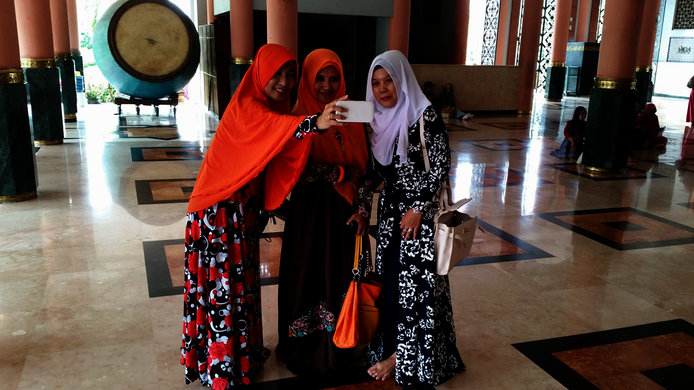Social media change religious practice

WhatsApp & Co have become an integral part of most people's daily lives, and their effects on communication and relationship patterns have been noticeable for quite some time. But what about the influence of social media on religious life? An example from Indonesia illustrates how modern information technologies and religiosity can complement each other: many middle-class Muslim women organize very popular weekly prayer groups (majelis taklim) to which the initiators often invite preachers. “It is quite common for the members to exchange telephone numbers with the preacher. If one of the women needs personal advice or emotional support, she will communicate with the preacher online via WhatsApp,” reports Martin Slama from the Institute for Social Anthropology (ISA) within the Austrian Academy of Sciences. The use of social media changes the communication between believers and preachers - a phenomenon that Slama, a cultural and social anthropologist, defines as a “dialogical construction of Islamic authority”.
Exploring the offline and the online world
This direct, personal online dialogue constitutes a new form of religious and social togetherness. For Muslim women in particular, this is an attractive alternative to face-to-face meetings because many of them find it easier to communicate about personal problems online: not only does this system bring relief, but it also enables the preachers to impart religious values and religious knowledge in a very targeted and timely manner. In a research project funded by the Austrian Science Fund FWF, Martin Slama, together with Eva Nisa (Australian National University) and Fatimah Husein (Universitas Islam Negeri Sunan Kalijaga Yogyakarta), Dayana Lengauer and Johann Heiss (both ISA), investigated the influence of social media on the emergence of new forms of social, religious interactions among Muslim men and women in Indonesia. The team relied on a participant-observation approach involving offline and online interaction spaces, and they conducted over one hundred interviews. Their research involved both major conurbations such as Yogyakarta, Jakarta and Bandung, as well as peripheral regions such as Sulawesi and the Moluccas. For online research, they explored the popular platforms Facebook, Instagram and YouTube as well as the messenger services WhatsApp and LINE.
Changing expectations for Islamic authorities
Despite the general differences, the online services have one thing in common in the context of this project: the central protagonists are preachers. However, the spectrum of who is regarded as an Islamic authority and what that essentially involves has changed. Social media play a central role in this process. In the past it was a priority for a preacher to have in-depth religious knowledge, for instance as an Islamic scholar, in order to be recognized as an Islamic authority. “Today, this status can also be acquired by someone who plays a leading role in a large Islamic organization, religious administration or a state-run Islamic university,” explains Slama.
Social media also make alternative career paths possible: if a local preacher is a skilled speaker, he can increase his reach via online platforms and be invited to other parts of the country. Some even achieve fame through digital communication. Hence, a factor of increasing importance today, alongside oratorical skills, is the ability to enter into a well-crafted online dialogue with believers via social media. “Middle-class women also judge Islamic authorities based on their online behaviour. Does he reply? If so, in what way and how quickly? Given that these women are the ones who organize prayer groups and issue invitations, they have a strong impact on the careers of preachers today,” notes Slama. The growing influence of middle-class Muslim women in Indonesia also affects the content of sermons. According to the researcher, many of them view polygamy very critically: “Indonesian preachers know better than to preach about that. But when a popular preacher took a second wife, he went from stardom to bogeyman overnight, and it almost meant the end of his career.”
Search for meaning through social media
Muslim women in the steadily growing Indonesian middle class are well situated, living in urban areas and the main island of Java and, unlike the poorer population, have enough time and money to use these new forms of communication and exchanges. Many have started their search for meaning later in life and, according to Slama, “rediscover religiosity for their lives”. This circumstance may explain the success of the largest Islamic online community “One Day One Juz”, which is open to all Muslim men and women. The idea behind it: the religious practice of reciting the Quran requires a high degree of self-discipline from the individual, and reading the various chapters regularly takes up a lot of time. This effort is shared by more than 100,000 members in small WhatsApp groups of 30 people each. As Eva Nisa, a member of the project team, reports, women, who are generally more active in WhatsApp groups than men, are the dominant driving forces here. A communitarian sense of accomplishment and the feeling of being able to lead a faithful life contribute to the positive self-perception of the individual and add to the popularity of this online community. Those who fail to benefit from these new forms of religious practice are the poorer strata in peripheral regions, where the technological infrastructure is deficient and daily life is marked by the struggle for survival. Because their limited technological access also affects their religious and social life, Slama calls it the “Islamic digital divide”. For the middle-class seekers of meaning, however, social media open up new, individual and dialogical forms of religiosity. Particularly women thus enjoy significantly more influence and a broader scope for participation than in the past.
Personal details Martin Slama is a researcher at the Institute for Social Anthropology (ISA) of the Austrian Academy of Sciences (ÖAW) focusing on Southeast Asia. He was a visiting researcher at Indonesian universities and for his doctoral thesis conducted field research on young Internet users in Indonesia. In earlier FWF projects, he conducted research on the Arab diaspora in Indonesia.
Publications






